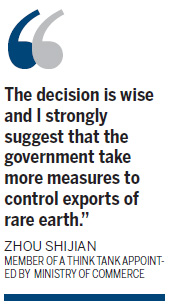Export tax to be raised on rare earth
Taxes will be increased on rare earth exports starting next year, the Ministry of Finance said on Tuesday, as China, the largest producer of the precious minerals, moves to protect the environment and its resources as well as regulate exports.
Rare earth, a group of 17 minerals, are a vital component in most of the world's new technologies and are used in high-tech processes ranging from wind turbines and hybrid cars to missiles.
The ministry did not specify which of the 17 minerals would be subject to the tax increase. Rare earth exports are currently subject to taxes ranging from 15 to 25 percent.
China has about 30 percent of global rare earth reserves, but produces 97 percent of the world's total. It reduced export quotas for 2010 to 60 percent of 2009 levels, causing alarm among importing countries, such as Japan, about supplies.
The market has yet to feel the impact of the announced tax adjustment.

"Our company will cut rare earth exports next year, but not on a large scale. The higher tariff will affect our exports," said a senior manager of Ganzhou Rare Earth Mineral Industry Co, in Jiangxi Province, who declined to be named. The company is the largest State-owned heavy rare earth producer in the province.
Lin Donglu, secretary-general of the Chinese Society of Rare Earths (CSRE) and also chairman of Baotou Steel Rare-Earth (Group) Hi-Tech, the largest producer in the world, said the CSRE has proposed tariff adjustments to relevant ministries but declined to give details.
China said the move was due to environmental concerns, as rare earth is usually found in underdeveloped regions and too much extraction has damaged the environment.
Since 2006, the country has imposed temporary taxes on rare earth exports and set limits on quotas.
Exports of 10 of the heavy rare earths, which have dwindling reserves, are likely to be affected more by increased taxes, industry sources said.
The Ministry of Commerce said in November that China still needed to improve the management of rare earth exports by using a combination of measures including export quotas, tax and regulation of exporters. The country now has 32 licensed exporters.
The ministry set higher environmental standards for producers and exporters and also said that the government will crack down on those who lack the required qualifications to work in the industry.
In the first nine months of this year, China exported 32,200 tons of rare earth, with half going to Japan and 19 percent to the United States, the ministry said.
Zhou Shijian, an early advocate of controlling rare earth production and member of a think tank appointed by the Ministry of Commerce, agreed with the tax increase.
"The decision is wise and I strongly suggest that the government take more measures to control exports of rare earth," he said.
"It is not wise for China to randomly produce rare earth and sell at cheap prices. It is time for China to protect rare earth and protect the environment.
"Foreign nations do not make sense when they blame China for reducing exports. Some of them can produce rare earth themselves. Nations that own rare earth resources should take the responsibility of producing and help supply global demand."
Chen Gong, chairman of Anbound Group, a private industry think tank, said the latest move by the Ministry of Finance protects precious resources.
"Other options may include further limiting export quotas or levying resource taxes," he said.
Decreasing exports from China have forced countries to seek alternative sources in Mongolia, Australia and India.
Producers in the US, which also has sizeable reserves of rare earth, are considering restarting production, stopped in 2002 because of low prices.
The US company Molycorp Inc, the only rare earth producer in the US, said on Monday that it had been granted permits to start a mining facility in California.
The company is expected to produce 20,000 tons of rare earth annually, more than the US demand of 16,000 tons.
The Japanese trading company Sumitomo has invested US$130 million into Molycorp for a guaranteed supply of rare earth for seven years.
 0
0 






